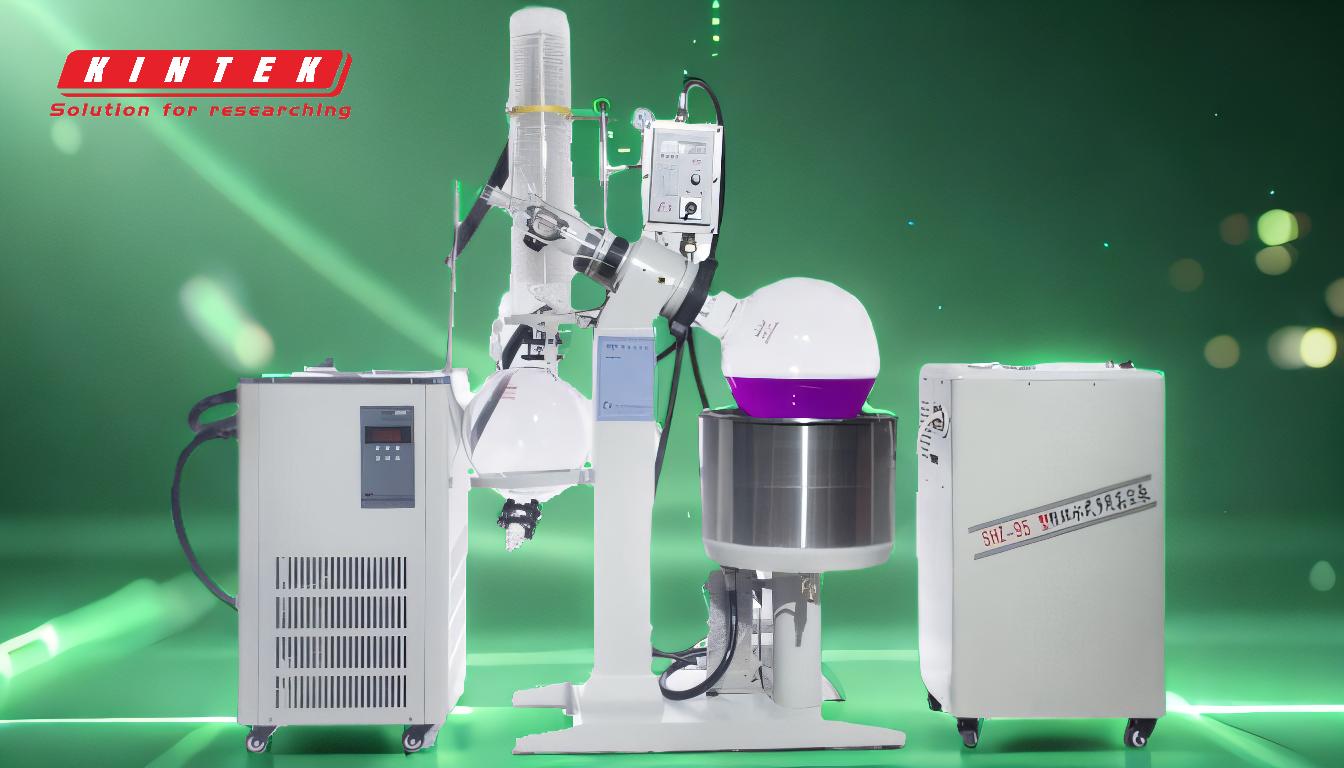The condenser in a rotary evaporator plays a critical role in the separation and recovery of solvents during the evaporation process. Its primary function is to cool and condense the solvent vapors generated from the heated sample, converting them back into a liquid state. This condensed liquid is then collected in a receiving flask for reuse or disposal. The condenser ensures efficient solvent recovery, prevents environmental contamination, and enhances the overall efficiency of the rotary evaporation process. It typically consists of a coiled glass tube surrounded by a water-cooled jacket, which facilitates the cooling process.
Key Points Explained:

-
Cooling and Condensing Solvent Vapors
- The condenser is designed to cool the solvent vapors that are evaporated from the liquid sample during the rotary evaporation process.
- By removing energy from the vapor, the condenser converts it back into a liquid state.
- This cooling process is essential for separating the solvent from the sample and recovering it efficiently.
-
Liquefaction for Collection
- Once the vapor is condensed into a liquid, it drips into a collecting flask or receiving vessel.
- This step ensures that the solvent is not lost and can be reused or disposed of properly.
- The collection process is a key aspect of the rotary evaporator's functionality, as it allows for the recovery of valuable solvents.
-
Preventing Environmental Contamination
- The condenser traps the solvent vapors, preventing them from escaping into the environment.
- This is particularly important when working with volatile or hazardous solvents, as it minimizes exposure and environmental impact.
- By ensuring that the solvent is contained and collected, the condenser contributes to safer laboratory practices.
-
Enhancing Process Efficiency
- The condenser improves the overall efficiency of the rotary evaporation process by enabling the recovery of solvents.
- Without a condenser, the solvent would be lost, requiring additional resources and time to replace it.
- The ability to reuse solvents also reduces costs and waste, making the process more sustainable.
-
Design and Mechanism
- The condenser typically consists of a coiled glass tube surrounded by a water-cooled jacket.
- The water-cooled jacket circulates cold water around the coiled tube, providing the necessary cooling effect to condense the vapor.
- This design ensures effective heat exchange and rapid condensation of the solvent vapors.
-
Integration with Vacuum System
- The condenser works in conjunction with the vacuum system of the rotary evaporator.
- The vacuum lowers the boiling point of the solvent, allowing it to evaporate at lower temperatures.
- The condenser then captures and condenses the vapor, completing the separation process.
-
Applications in Solvent Recovery
- The condenser is particularly useful in applications where solvent recovery is critical, such as in chemical synthesis, pharmaceutical production, and environmental analysis.
- It allows for the efficient reuse of solvents, reducing costs and minimizing waste.
- In research and industrial settings, the condenser is a vital component for maintaining productivity and sustainability.
In summary, the condenser in a rotary evaporator is a crucial component that ensures the efficient recovery of solvents by cooling and condensing vapors into a liquid for collection. Its design and functionality contribute to safer, more sustainable, and cost-effective laboratory processes.
Summary Table:
| Key Function | Description |
|---|---|
| Cooling and Condensing Vapors | Converts solvent vapors into liquid for efficient recovery. |
| Liquefaction for Collection | Collects condensed solvent in a flask for reuse or disposal. |
| Preventing Environmental Impact | Traps vapors to minimize exposure and contamination. |
| Enhancing Process Efficiency | Improves solvent recovery, reduces costs, and minimizes waste. |
| Design and Mechanism | Coiled glass tube with a water-cooled jacket for effective heat exchange. |
| Integration with Vacuum System | Works with vacuum to lower boiling points and complete the separation process. |
| Applications in Solvent Recovery | Critical in chemical synthesis, pharmaceuticals, and environmental analysis. |
Learn how a rotary evaporator condenser can optimize your lab's efficiency—contact us today for expert advice!










